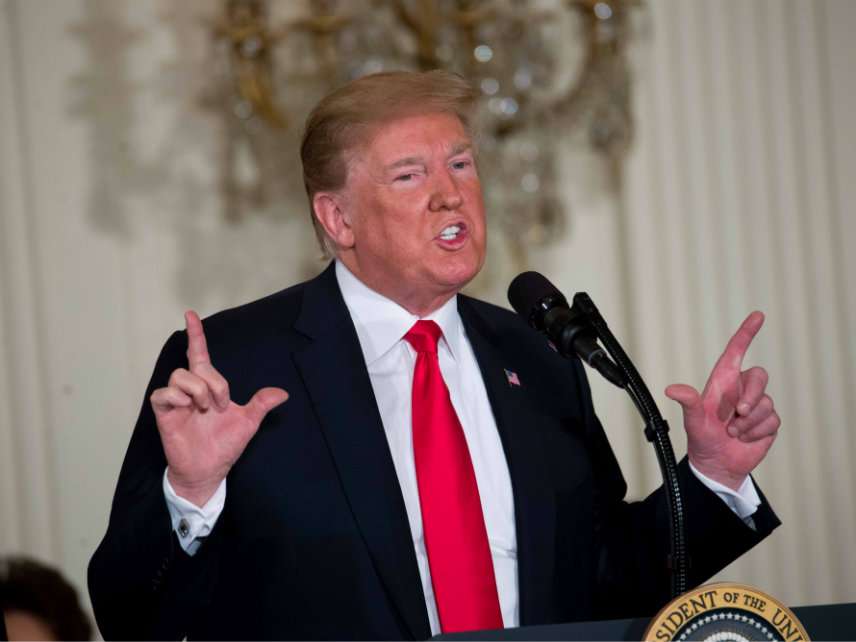Trump Ignores Critics, Claims 'Everyone Is Very Excited' About Space Force
In Trump's world, "everyone" is absolutely thrilled about his widely criticized plans to establish an entirely new branch of the U.S. military.

"Everyone is very excited" about the establishment of a Space Force, President Donald Trump said Wednesday. Numerous critics of creating a sixth branch of the U.S. military say otherwise.
Trump made this assertion during his speech at a July 4 military appreciation event on the South Lawn of the White House. "We have the Air Force—and by the way, I might add, we very well may soon have the Space Force. You've been hearing about that," the president said. "Everyone is very excited about that."
Trump officially announced plans to establish the Space Force as a co-equal branch of the military during a meeting last month of the National Space Council. "When it comes to defending America, it is not enough to merely have an American presence in space," Trump claimed. He instructed the Department of Defense and the Pentagon "to immediately begin the process necessary to establish" a Space Force.
The United States already has the most powerful military in the world. Why not press our advantage and expand into space?
It's not that simple, according to Bryan Nakayama, an international relations expert and visiting lecturer at Mount Holyoke College who specializes in the relationship between technology and warfare.
Writing in Fortune, Nakayama notes that there are already various defense agencies that deal with space, though for the most part they are tied to their own "parent services." According to The Wall Street Journal, which cited a 2016 study from the Government Accountability Office, there are "60 distinct entities that deal with assets in space." Thus, the establishment of a Space Force would be quite confusing, as all of these agencies with "differing organizational cultures and allegiances" would have to find a way to coexist under one banner, Nakayama writes.
It's also worth pointing out that the U.S. already has a kind of Space Force—the Air Force Space Command. According to the Journal, more than 36,000 people work for the Air Force Space Command. Setting up a new headquarters for the Space Force "would spawn hundreds of new aides and staffers."
And that's not all. According to Nakayama, the U.S. depends heavily on Russia for imported rocket engines and "regular access to the International Space Station." Russia, meanwhile, has expressed apprehension about the creation of a U.S. Space Force, warning of a "tough response" if the U.S. pulls out of the U.N. Outer Space Treaty. Establishing a Space Force when the U.S. can't even get into space on its own seems ill advised, all the more so when considering the dangers of having a branch of the military depend on one of America's biggest rivals.
There's also the issue of the potential weaponization of outer space. The Outer Space Treaty prohibits the use of weapons of mass destruction in space, as well as the installation of military bases on the moon and asteroids, but as the University of Kent's Gbenga Oduntan notes, the treaty does not preclude member countries from deploying other kinds of weapons in outer space. If Trump's Space Force triggers an arms race in space, we could see "a total disruption of the agreed law that outer space is the common heritage of all humankind."
People who support space exploration are also opposed to the creation of a Space Force. Mark Kelly, a retired astronaut and Navy combat veteran, called it a "dumb idea," explaining on Twitter that "The Air Force does this already."
"What's next, we move submarines to the 7th branch and call it the 'under-the-sea force?'" he wrote.
This is a dumb idea. The Air Force does this already. That is their job. What's next, we move submarines to the 7th branch and call it the "under-the-sea force?" https://t.co/S1urOuJBe6
— Mark Kelly (@ShuttleCDRKelly) June 19, 2018
Even Defense Secretary James Mattis, who has no choice but to follow Trump's orders, doesn't seem to be a fan of the Space Force. When a bipartisan group of lawmakers tried to include language creating a new "Space Corps" in the 2018 National Defense Authorization Act, Mattis strongly opposed the idea, writing in a letter, "I oppose the creation of a new military service and additional organizational layers at a time when we are focused on reducing overhead and integrating joint warfighting functions."
Trump's assertion that "everyone is very excited" about the Space Force isn't exactly true. Trump being Trump, though, the criticism may only fuel his enthusiasm.


Show Comments (43)